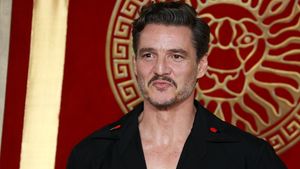The residents of San Francisco's 28 Barbary Lane -- the fictional setting of Armistead Maupin's acclaimed series Tales of the City -- featured a mix of LGBT and straight residents. But none were people of color. That was a "mistake," said the writer, who's the subject of a new documentary, The Untold Tales of Armistead Maupin.
Maupin, at the Q&A following the documentary's premiere Friday at the Outfest Los Angeles LGBT Film Festival, said he was "guilty" of whitewashing in response to an identified "black queer" audience member, who noted "a distinct lack of representation" in the series.
"I was scared as a writer that I would look uncool if I tried to represent people who were not of my race and didn't do it well. That's just stupid. I took on lesbians, and I didn't think I knew anything about them. As I said in the [documentary], it's about the human heart, so that was a mistake on my part," Maupin responded.
Maupin referenced his conservative upbringing. The documentary revealed the gay writer's surprising family history: Maupin grew up in North Carolina with a father who regularly used the n word, and was the descendant of a Confederate general who was a proponent of slaveowner rights. Maupin also worked for the anti-LGBT Sen. Jesse Helms, served in the Vietnam War, and shook hands with President Richard Nixon before coming out as gay at 25.
Afterward, Maupin would go on to write Tales of the City, a groundbreaking series of novels about LGBT San Francisco. Debuting in the 1970s as a serial column in the Pacific Sun and the San Francisco Chronicle, Tales offered readers an unprecedented look at the city's queer residents. It was also one of the first written works to address the AIDS crisis.
PBS first aired a Tales of the City miniseries, starring Laura Linney as straight newcomer Mary Ann Singleton and Olympia Dukakis as her transgender landlady, Anna Madrigal, in 1991. Due to controversy over its LGBT depictions, later installments would air on Showtime. Netflix recently announced it has greenlit a 10-part revival of Tales of the City that will bring Dukakis and Linney back to these roles.
When asked by the audience member if future stories would "encompass the totality of the queer community," Maupin said yes.
"We are really remedying that in the new Tales of the City, the new [Netflix] television series," said Maupin. "If I'm given credit for educating the rest of the world, I've also been educating myself in this whole process. But yeah, I agree with you, and we're gonna do something about it."
"Thank you for sharing that, because I know how I felt, just as a queer person, not seeing myself represented in culture. So I get it," he concluded.
Directed by Jennifer M. Kroot, The Untold Tales of Armistead Maupin will come out this fall. A memoir by Maupin, Logical Family, will also be released in October. Watch the Outfest conversation, starting at around 33:00, in the video below.













































































